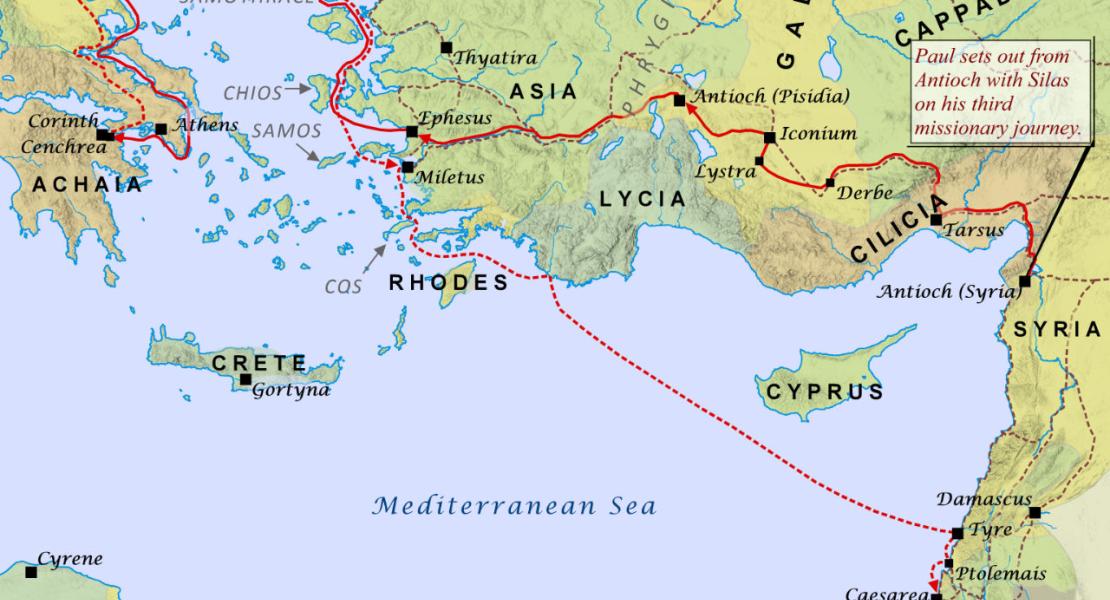Acts 20 opens with an overview of Paul’s travels with his companions, then narrows the focus down to a couple of significant events, one at Troas, which is between Philippi and Ephesus, and one at Miletus, south of Ephesus. In these events we hear more detail about the kinds of encouragements that Luke describes much more generally in the first few verses.
20:1-6
The map below gives a sense of this part of the travels. Though we hear it narrated quickly, it’s over the course a a number of months.

20:5 Luke again switches from a third-person perspective (Paul/he/they) to a first-person one (we). Luke didn’t travel with Paul on all his journeys, but was there for some of them, including the miraculous account of the young man Eutychus being raised from the dead.
20:7-12
20:7-8 The first day of the week is Sunday, also known as the Lord’s Day. After the resurrection of Jesus, worship gatherings shift focus to the first day of the week rather than the Sabbath (Saturday, the last day of the week) due to the resurrection of Jesus happening on that day (Luke 24:1). Though we’re not told explicitly, this was likely a worship gathering, and “breaking bread” very likely included the Lord’s Supper (Acts 2:42). However, this gathering doesn’t end an hour later; it goes on...and on!
20:9-10 We might be tempted to chuckle at the image of someone falling asleep as a preacher continues talking. (It’s happened many-a-time, I’m sure!) And this was now around midnight, so it’s perfectly reasonable that this young man fell asleep. But Luke describes both a tragedy and a miracle: that Eutychus dies after falling out of the window, and then is raised to life again by Paul. It almost reads as nonchalant the way Paul treats it, and we dare not take it for granted. But such is the power of God to raise from death! Even though dead, there is still life possible with God; this may well be a reminder for us of Jesus’ words to Martha in John 11:25 “I am the resurrection and the life. Whoever believes in me, though he die, yet shall he live,”.
20:11-12 Paul again takes food with the others. This was probably not a second celebration of the Lord’s Supper, but another time to simply eat together and be refreshed. They will stay up all night in holy conversation!
20:13-16
The travelling group departs from Troas that next day and they begin to journey back towards Jerusalem, as Paul’s goal was to be there for the festival of Pentecost (20:17).
20:17-38
20:17 Though Paul didn’t want to stop in Ephesus because it was likely to delay him too long, he very much wanted to connect with the elders (pastors) of the church there. Remember he had spent a couple years among them, ministering, and—we can surmise—training them to be pastors.
20:18-21 Paul summarizes his ministry there: proclaiming many things from God, and above all, repentance and faith in Christ.
20:22-24 Looking ahead to Jerusalem, he doesn’t know what awaits him there (recall all the conflicts he’s had in his ministry with Jews who rejected the Gospel), but is confident that his call to ministry continues.
20:25 This was going to be the last time he would see this group of men that he loved dearly. It sets the stage for his emotional departure from them that we’ll hear about in a few more verses.
20:26-28 Paul’s admonition to them is to follow in his footsteps, proclaiming “the whole counsel of God”—which we describe in our circles both Law and Gospel— and that they were to continue in that as men who God Himself has called to be overseers (elder, overseer/bishop, and pastor/shepherd are all interchangeable titles in the New Testament) over God’s Church. Notice, not their church, but God’s. Not their own decision to be overseers, but God’s.
20:29-31 Paul knows from experience that false teaching always creeps into the church, so as “undershepherds” to the flock they’re to be on the lookout for wolves. The shepherding metaphor for pastoring is an apt one.
20:32 It is God and His Word that builds up and sustains men in ministry, and the whole Church in her life together.
20:33-34 Paul was a tentmaker and set an example for them to follow. While a elder/overseer/pastor has the right to earn a living from doing ministry, it’s not a requirement (see also 1 Corinthians 9:1-15 and 2 Corinthians 11:7-9).
20:35 Paul gives us the words of Jesus that he must have received directly from Jesus; this phrase isn’t recorded in any of the Gospel accounts. But Jesus did and said much more than is recorded in Matthew through John (John 20:30-31) so there’s no reason to doubt that Paul heard these words from Jesus.
20:36-38 This parting was bittersweet: bitter in an earthly way because of the strong bond of fellowship they shared, but sweet because the bond they shared was in the Gospel. What a beautiful picture of the Church! Sad at earthly partings, but strong in faith that Gospel work continues even when apart. And, though not mentioned here, there is also the knowledge that they will be reunited in eternal life together with God and all the saints.
